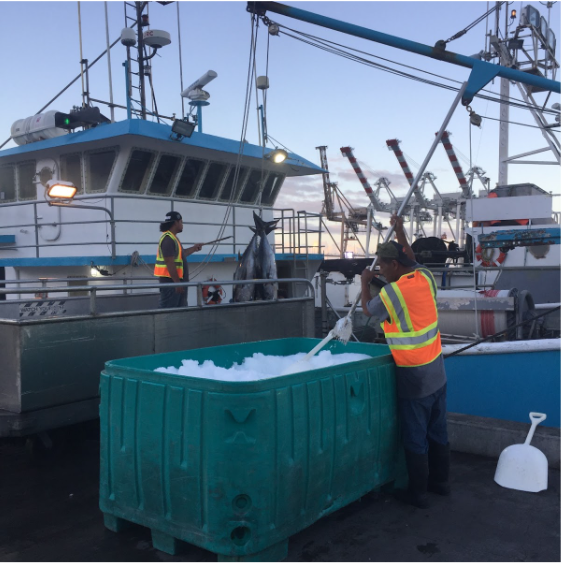The Papahānaumokuākea Marine National Monument was recently the site of a study conducted by the University of Hawaii in collaboration with the University of Wisconsin on the effects marine protected areas have on local fish populations and fisheries.
The monument is one of the largest marine protected areas in the world. According to their website, it spans about 582,578 square miles of the Pacific Ocean making it larger than all of the national parks in the United States combined. This area holds great importance to Native Hawaiians and conservationists, and since 2006 has stood to preserve cultural sites and marine ecosystems surrounding the Northwest Hawaiian Archipelago.
UW Department of Forest and Wildlife Ecology professor Jennifer Raynor co-authored the study with University of Hawaii professors Sarah Medoff and John Lynham. The study demonstrated that although marine protected areas prevent fishing in those zones, fisheries are still able to profit from these conservation efforts.
Marine protected areas are regions designated for long-term preservation of marine ecosystems, resources and areas of cultural heritage, according to the National Oceanic and Atmospheric Administration. While previous studies have shown that these areas protect local fish populations, the effects on migratory species that tend to travel great distances were unclear.
DEI interns measure imposter phenomenon within UW Biocore Program, find promising results
Researchers applied the methodology from a study on the effects of marine reserves on large scale fisheries in the Gulf of Mexico to the recent Hawaii research. The research in Hawaii specifically examined bigeye and yellowfin tuna which are two local migratory fish species.
According to the study, by collecting spatiotemporal data on catch and measuring distance of higher catches from the PMNM border, the researchers found that protection within the MPA led to spillover benefits for local fisheries. These fish populations recovered under protection, and there is now a higher abundance of fish outside the MPA. This effect is called a spillover and can increase the catch rates and profits of fishers.
“There’s certainly cultural and spiritual benefits of protecting this place, but there’s a lot of controversy because there’s also a cost to protecting it,” Raynor said. “And those costs happen because of impacts on the fishing industry. If you’re able to find economic benefits from putting a place like this in, it shows that there might be a win-win, which I think is pretty exciting.”
Stalagmites in Wisconsin’s Cave of Mounds hold clues to previous climate changes in state
University of Hawaii Economics professor John Lynham and Raynor emphasize the importance of the intersection of economics and sustainability. According to Lynham, economics plays a big role in thinking about how to move towards a more sustainable society. This research suggests that protecting biodiversity doesn’t always have to mean conflict between fishing and conservation.
While there are many benefits to MPAs, drawbacks still exist. According to Raynor, one of these main drawbacks is that it forces people who are fishing to relocate. She said that there’s an upfront cost of losing access to potentially profitable fishing grounds, but there can be payoff later in the form of spillover events.
“The intersection of sustainability and economics have to do with incurring costs in the short run, in order to get benefits either environmental or economic, in the future,” Lynham said.
Native Hawaiian and a Research Ecologist at the National Oceanic and Atmospheric Administration Randall Kosaki said there are tangible benefits for commercial fisheries, but some fishers rely on a monthly paycheck to survive and can’t always wait for the payoff to occur.
UW researchers awarded grant to study cure for devastating bat disease
This research comes as groups are pursuing marine conservation efforts at the local, national and international levels. President Biden has proposed a new National Monument Sanctuary designation to protect all United States waters around the Pacific Remote Islands. This potential new National Marine Sanctuary would conserve 770,000 square miles and could allow NOAA to examine cultural and scientific aspects of the area to manage it accordingly.
“This paper is very timely because we’re going through sanctuary designation right now, so we’re in that arm wrestling contest with our Fishery Management Council,” Kosaki said. “Then on top of that, Biden is now proposing to do this with all these other remote Pacific islands. It’s not just about Papahānaumokuākea, it’s not just about Hawaii, it’s about half the Pacific.”
Babcock Hall Dairy Plant celebrates new facility renovations
Biden proposed this policy shortly after the United Nation Convention on Biodiversity drafted a Global Biodiversity Framework, referred to as “30 by 30”, which aims to have 30% of the global land and sea areas protected by 2030. The goal of the framework is to protect the environment, especially areas of importance for biodiversity and human support through area-based conservation methods.
As countries prepare to put 30 by 30 into effect, this research can act as a foundation to create successful MPAs.
According to Raynor, the methods of this study are transferable so the measures used to study Papahānaumokuākea can be applied to other MPAs. She said that this research could be useful for analyzing other large MPAs to identify the important features that can help increase the probability of success for future MPAs.


















